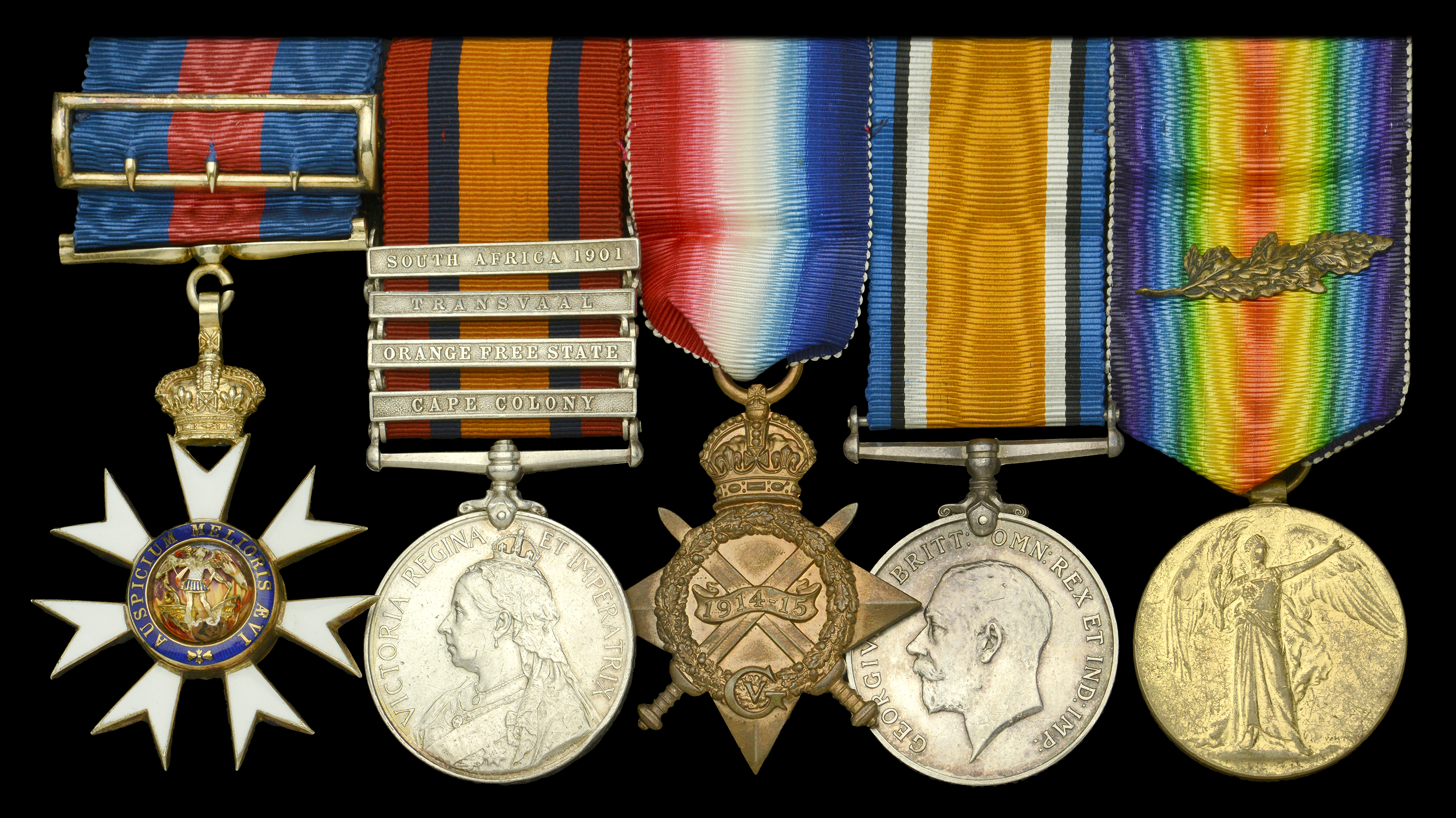A fine Great War ‘Gallipoli’ C.M.G. group of five awarded to Lieutenant Colonel C. R. Pilkington, (Commanding) 6th Battalion, Manchester Regiment, formerly 7th (Manchester) Company, 8th Battalion, Imperial Yeomanry, who was wounded in action on 4 June 1915 at the Battle of Krithia and again at Le Cateau on 21 October 1918 when he suffered shell gas poisoning The Order of St. Michael and St. George, C.M.G., breast badge, silver-gilt and enamels, complete with ribbon buckle, some minor enamel damage; Queen’s South Africa 1899-1902, 4 clasps, Cape Colony, Orange Free State, Transvaal, South Africa 1901 (Lieut., C. R. Pilkington. 77 Co. 8/Imp. Yeo.) last clasp a contemporary tailor’s copy; 1914-15 Star (Major C. R. Pilkington. Manch. R.); British War and Victory Medals, with M.I.D. oak leaf (Lt. Col. C. R. Pilkington.) minor edge bruising and contact wear to Q.S.A., otherwise generally very fine or better (5) (5) £2,200-£2,600 --- Provenance: Dix Noonan Webb, December 2004 C.M.G. London Gazette 8 November 1915: ‘For distinguished service in the field during the operations at the Dardanelles.’ M.I.D. London Gazette 5 November 1915 [General Ian Hamilton’s Despatch for the Dardanelles]. Charles Raymond Pilkington was born in 1875 and educated at Clifton College. He lived at Haydock, Lancashire and was a Colliery Proprietor. Pilkington served with the 77th (Manchester) Company, Imperial Yeomanry during the Second Boer War, being present at the Relief of Mafeking; operations in the Transvaal, May and June 1900; operations in the Transvaal, east of Pretoria, July and August 1900; operations in the Orange River Colony, 30 November 1900 to January 1901 (Q.S.A. roll confirms entitlement to South Africa 1901 clasp). During the Great War he served with the Manchester Regiment in Gallipoli, Egypt and France. Pilkington received a rifle gun shot wound to the forehead at Gallipoli on 4 June 1915 and suffered shell gas poisoning at Le Cateau on 21 October 1918. Lieutenant Colonel Pilkington relinquished his commission in January 1922 and died on 27 October 1938. The following is extracted from The Lancashire Fighting Territorials, by George Bigwood: ‘The battalion went to Egypt (September 1914) under its Commanding Officer, Lieutenant Colonel G. G. P. Heywood, who had the misfortune to fall sick before his men left for Gallipoli, and was subsequently invalided home. The command of the battalion on the Peninsula therefore devolved upon Major C. R. Pilkington, who was promoted to Lieutenant Colonel. The regret felt by all ranks in consequence of the confinement to hospital of Colonel Heywood was tempered by the appointment of Major Pilkington as the Battalion’s leader. The Pilkington’s like the Heywood’s, have a long and honoured connection with the commissioned ranks of the 6th Manchesters and neither officer could wish for a more devoted body of men...’ The following is extracted from a letter written by Major-General W. Douglas to Lieutenant Colonel Pilkington after the Battle of Krithia. It was in this action that Pilkington had, what the Battalion War Diary refers to as ‘a very lucky escape’, when he was only slightly wounded by a gun shot wound to the forehead: ‘My dear Pilkington, in regard to our conversation today, I am still hoping that you may be able to collect evidence of some of the special acts of gallantry by officers and men of our battalion during the assault of 4 June. It is most unfortunate, that owing to the many casualties sustained, many deeds worthy of the Victoria Cross have not been reported. I hope that your men know this. The dash, steadiness, reckless bravery and endurance shown by the 6th Manchesters and indeed by the whole Brigade was equal to the best traditions of the British Army...’ The following is again extracted from The Lancashire Fighting Territorials, by George Bigwood: ‘Two days after the battle [of Krithia] one of the wounded officers sent to a brother officer in Manchester an account of the extent to which the Battalion suffered: “... The C.O. I hear had a slight wound, but I believe was able to remain near the firing line. I can only trust and pray that this is so. He is doing splendidly as C.O., and you know we are all devoted to him.” ... After the big engagement on 7 August only 93 men were left to answer the roll-call. Referring to this engagement, Colonel Pilkington said: “In the old volunteer days we used to say that the regiment would give a good account of itself when it came to hard knocks, but no one ever thought that the men would get so many hard knocks in so short a time as they got at Gallipoli. There was not a single man, however, who did not do his work thoroughly and well. I am proud of them. Everything was done cheerfully and without murmur. On 7 August we were in the front trenches and about nine o’clock at night we wee ordered to take a line 350 yards across. We got forward that night 150 yards in eight or nine hours, the Turkish trenches being only 300 yards away. That, I think, was the finest thing the regiment has ever done, especially when you consider that it was performed by men many of whom probably never used spades and shovels until the outbreak of war.” Sold with comprehensive copied research detail.








